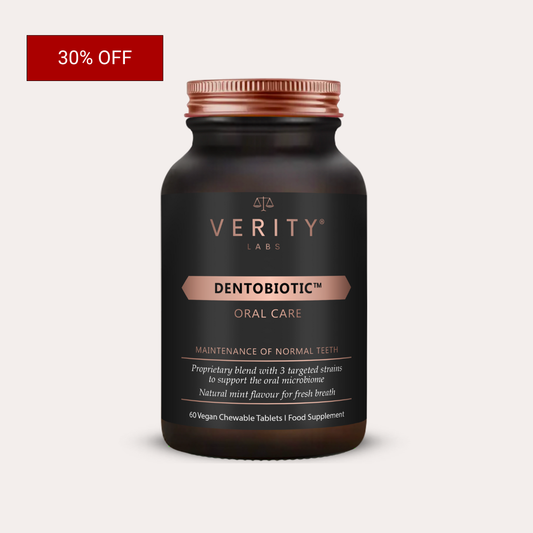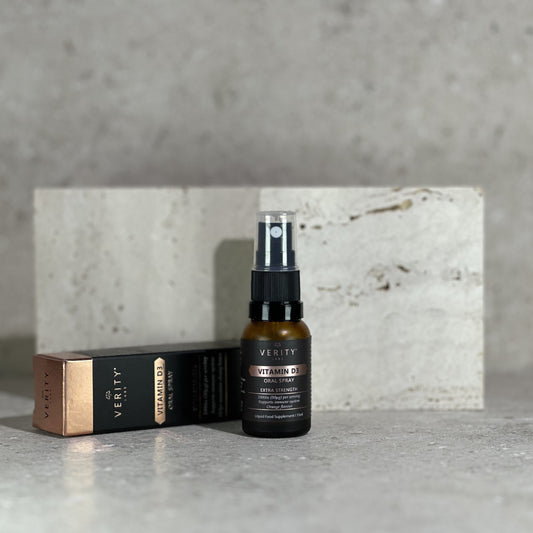Understanding the critical role of vitamins in maintaining optimal bodily functions is paramount for overall health. Among these vital nutrients, Vitamin D stands out as indispensable, primarily sourced from sunlight and select dietary items. However, inadequate levels of this essential vitamin can trigger a cascade of adverse effects on the body. For those grappling with Vitamin D deficiency, Verity Labs offers convenient access to high quality Vitamin D supplements in a form of oral spray.
Introduction to Vitamin D
Vitamin D is a fat-soluble nutrient which holds important significance for human health, supporting various bodily functions, including:
- Bone Health: Supports calcium absorption, vital for strong bones and teeth.
- Immune Function: Helps regulate immune system responses, aiding in defence against infections.
- Mood Regulation: Contributes to mood stability and may reduce the risk of depression.
- Muscle Strength: Supports muscle function and helps prevent weakness and fatigue.
- Chronic Disease Prevention: May lower the risk of certain chronic conditions like cardiovascular disease and certain cancers.
While sunlight exposure and certain foods supply Vitamin D, factors such as weight loss surgeries, malabsorption issues, prolonged indoor confinement, or specific medical conditions may elevate the risk of deficiency. Notably, while many individuals obtain sufficient Vitamin D from sunlight exposure and diet, certain populations remain vulnerable to deficiency.
Health Implications of Prolonged Deficiency
Persistent Vitamin D deficiency can precipitate several health complications, including:
- Bone Disorders: Rickets in children and osteomalacia in adults, characterized by weakened and soft bones, leading to an increased risk of fractures and skeletal deformities.
- Osteoporosis: A condition marked by decreased bone density and increased fragility, predisposing individuals to fractures, particularly in the hip, spine, and wrist.
- Muscle Weakness and Pain: Vitamin D deficiency can impair muscle function, leading to weakness, fatigue, and generalized body pain.
- Impaired Immune Function: Inadequate Vitamin D levels may compromise immune responses, increasing susceptibility to infections and reducing the body's ability to fight off pathogens.
- Increased Risk of Chronic Diseases: Emerging research suggests that Vitamin D deficiency may be associated with an elevated risk of various chronic conditions, including cardiovascular diseases, certain cancers, autoimmune disorders, and metabolic disorders. However, further studies are needed to establish definitive causal relationships.
It's crucial to note that while Vitamin D deficiency manifests through various symptoms, individual experiences may vary. Consulting a healthcare professional and undergoing blood tests for Vitamin D levels can provide personalised insights into deficiency management.
Why Vitamin D3 is Preferred over D2:
Vitamin D3 and Vitamin D2 are both commonly used to address Vitamin D deficiencies, but Vitamin D3, particularly from vegan sources like lichen, is often preferred due to its higher bioavailability and effectiveness in raising and maintaining serum Vitamin D levels compared to Vitamin D2. While both forms can be beneficial, studies suggest that Vitamin D3 is structurally closer to the form naturally produced in the body and is more readily converted into its active form, calcitriol, leading to superior outcomes. This preference for Vitamin D3 is reflected in guidelines from organizations like the Endocrine Society and the National Institutes of Health (NIH), which advocate for its use. Ultimately, individual preferences, dietary considerations, and healthcare provider recommendations should inform the choice between Vitamin D3 and D2 supplementation.
UK Government Guidelines for Vitamin D
In the United Kingdom, the government issues recommendations regarding Vitamin D supplementation, particularly during the autumn and winter months when sunlight exposure is limited. Public Health England advises all adults to consider taking a daily supplement containing 10 micrograms (µg) of Vitamin D, especially during the colder seasons. This recommendation extends to individuals who may have limited sun exposure, such as those who are housebound, work indoors, or have darker skin tones. Pregnant and breastfeeding women are also encouraged to ensure adequate Vitamin D intake to support both maternal and fetal health.
In the cases of Vitamin D deficiency, the UK guidelines for individuals typically involve a more substantial supplementation to achieve adequate levels. The National Institute for Health and Care Excellence (NICE) advises the following:
- Treatment: For individuals diagnosed with Vitamin D deficiency, NICE recommends an initial high-dose oral supplement, typically 50,000 international units (IU) of Vitamin D3 once a week for several weeks to rapidly correct deficiency.
- Maintenance: Following the initial high-dose treatment, individuals may transition to a lower maintenance dose, typically 800-2000 IU of Vitamin D3 daily or intermittently, depending on individual circumstances and risk factors.
- Monitoring: Healthcare professionals should monitor Vitamin D levels regularly, especially in high-risk groups or those with conditions predisposing them to deficiency, to ensure optimal Vitamin D status is maintained.
- Diet and Sunlight: While dietary sources of Vitamin D and sensible sunlight exposure are encouraged for maintaining Vitamin D levels, they are generally insufficient to address deficiency on their own, particularly in regions with limited sunlight exposure, such as the UK, especially during winter months.
It's essential for individuals with Vitamin D deficiency to follow healthcare provider recommendations closely and undergo regular monitoring to prevent recurrence and mitigate associated health risks.
Tips for Sustaining Optimal Vitamin D Levels
Promoting healthy Vitamin D levels entails adopting proactive measures:
- Sun Exposure: Allocate brief periods (10-15 minutes) of sunlight exposure on uncovered skin areas multiple times weekly
- Dietary Sources: Incorporate Vitamin D-rich foods such as fatty fish, eggs, and fortified products like milk and cereals into your diet
- Supplementation: Consider high quality Vitamin D supplements if sunlight exposure or dietary intake falls short of meeting requirements.
Additionally, optimising Vitamin D absorption necessitates:
- Sunscreen Use: Employ sunscreens with SPF 30 or higher to safeguard against UV rays while ensuring adequate Vitamin D synthesis.
- Adequate Calcium and Magnesium Intake: Consume calcium-rich foods like dairy and leafy greens, alongside magnesium sources such as nuts, seeds, and whole grains.
At Verity Labs we suggest to check your Vitamin D levels regularly. You can do so by purchasing our Essential Health Check blood test that checks for various key biomarkers including Vitamin D. For individuals with vitamin D deficiency, we offer high quality vegan Vitamin D3 oral spray supplement.
FAQs
Common Causes of Vitamin D Deficiency: Factors contributing to deficiency include inadequate sunlight exposure and certain medications.
Symptoms of Deficiency: Indications encompass fatigue, muscle weakness, depression, and joint abnormalities, among others.
Diagnosis: Vitamin D levels can be assessed through a routine blood test.
Sunlight Sufficiency: While sunlight exposure may suffice for some, supplementation may be necessary to ensure adequate Vitamin D levels.
Necessity of Supplements: Despite dietary adjustments and sunlight exposure, supplementation may be warranted for swift Vitamin D replenishment.
References:

















